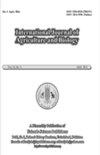{"title":"拮抗芽孢杆菌和生物炭对大豆尖孢镰刀菌根腐病的防治效果评价","authors":"Fan Yang","doi":"10.17957/ijab/15.1836","DOIUrl":null,"url":null,"abstract":"Soybean root rot is a worldwide soil-borne fungal disease threatening soybean production, causing huge losses in yield and quality of soybean. Fusarium species are well recognized as the important causal agent of Fusarium root rot. To screen the beneficial Bacillus strains with capability of suppressing soybean root rot and evaluate the impact of Bacillus combined with biochar against soybean root rot, a pot experiment was conducted with different treatments. In this study, as potential biological control measures, antagonistic Bacillus isolates and different types of biochar were added to soil separately and excellent antagonistic strains mixed with bamboo biochar were applied to the soil. The results showed that seven Bacillus strains promoted the growth of soybean seedlings and reduced root rot severity by 33 to 61%. Bacillus amylolique faciens NH2 was associated with the lowest incidence of soybean root rot, indicating its bio-control potential. The value of plant height, root length and plant dry weight of soybean in the sterilized soil mixed with biochar separately treatment were superior to those of soybean in the inoculated with pathogen treatment, especially the bamboo biochar treatment reduced soybean root rot caused by Fusarium significantly and which bio-control efficacy was 77.41%. The soybean plants shoot and root dry weights in the biochar mixed B. amylolique faciens NH2 or B. subtilis DBK treatments were increased by17.1, 10.7% and 19.51, 19.64%, respectively, which were significantly higher than those of the inoculated pathogen treatment. Compared to antagonistic strain or biochar individual treatments, the disease control efficiency on soybean root rot was up to 64.86% in NH2 strain mixed with bamboo biochar treatment, which reduced root rot severity significantly and showed a synergistic effect. These results suggest that antagonistic Bacillus strains mixed with biochar can be used as an effective alternative in managing soybean root rot. © 2021 Friends Science Publishers","PeriodicalId":13769,"journal":{"name":"International Journal of Agriculture and Biology","volume":null,"pages":null},"PeriodicalIF":0.0000,"publicationDate":"2021-08-01","publicationTypes":"Journal Article","fieldsOfStudy":null,"isOpenAccess":false,"openAccessPdf":"","citationCount":"0","resultStr":"{\"title\":\"Evaluation of Antagonistic Bacillus and Biochar against Soybean Root Rot Caused by Fusarium oxysporum\",\"authors\":\"Fan Yang\",\"doi\":\"10.17957/ijab/15.1836\",\"DOIUrl\":null,\"url\":null,\"abstract\":\"Soybean root rot is a worldwide soil-borne fungal disease threatening soybean production, causing huge losses in yield and quality of soybean. Fusarium species are well recognized as the important causal agent of Fusarium root rot. To screen the beneficial Bacillus strains with capability of suppressing soybean root rot and evaluate the impact of Bacillus combined with biochar against soybean root rot, a pot experiment was conducted with different treatments. In this study, as potential biological control measures, antagonistic Bacillus isolates and different types of biochar were added to soil separately and excellent antagonistic strains mixed with bamboo biochar were applied to the soil. The results showed that seven Bacillus strains promoted the growth of soybean seedlings and reduced root rot severity by 33 to 61%. Bacillus amylolique faciens NH2 was associated with the lowest incidence of soybean root rot, indicating its bio-control potential. The value of plant height, root length and plant dry weight of soybean in the sterilized soil mixed with biochar separately treatment were superior to those of soybean in the inoculated with pathogen treatment, especially the bamboo biochar treatment reduced soybean root rot caused by Fusarium significantly and which bio-control efficacy was 77.41%. The soybean plants shoot and root dry weights in the biochar mixed B. amylolique faciens NH2 or B. subtilis DBK treatments were increased by17.1, 10.7% and 19.51, 19.64%, respectively, which were significantly higher than those of the inoculated pathogen treatment. Compared to antagonistic strain or biochar individual treatments, the disease control efficiency on soybean root rot was up to 64.86% in NH2 strain mixed with bamboo biochar treatment, which reduced root rot severity significantly and showed a synergistic effect. These results suggest that antagonistic Bacillus strains mixed with biochar can be used as an effective alternative in managing soybean root rot. © 2021 Friends Science Publishers\",\"PeriodicalId\":13769,\"journal\":{\"name\":\"International Journal of Agriculture and Biology\",\"volume\":null,\"pages\":null},\"PeriodicalIF\":0.0000,\"publicationDate\":\"2021-08-01\",\"publicationTypes\":\"Journal Article\",\"fieldsOfStudy\":null,\"isOpenAccess\":false,\"openAccessPdf\":\"\",\"citationCount\":\"0\",\"resultStr\":null,\"platform\":\"Semanticscholar\",\"paperid\":null,\"PeriodicalName\":\"International Journal of Agriculture and Biology\",\"FirstCategoryId\":\"1085\",\"ListUrlMain\":\"https://doi.org/10.17957/ijab/15.1836\",\"RegionNum\":0,\"RegionCategory\":null,\"ArticlePicture\":[],\"TitleCN\":null,\"AbstractTextCN\":null,\"PMCID\":null,\"EPubDate\":\"\",\"PubModel\":\"\",\"JCR\":\"Q2\",\"JCRName\":\"Agricultural and Biological Sciences\",\"Score\":null,\"Total\":0}","platform":"Semanticscholar","paperid":null,"PeriodicalName":"International Journal of Agriculture and Biology","FirstCategoryId":"1085","ListUrlMain":"https://doi.org/10.17957/ijab/15.1836","RegionNum":0,"RegionCategory":null,"ArticlePicture":[],"TitleCN":null,"AbstractTextCN":null,"PMCID":null,"EPubDate":"","PubModel":"","JCR":"Q2","JCRName":"Agricultural and Biological Sciences","Score":null,"Total":0}
引用次数: 0
Evaluation of Antagonistic Bacillus and Biochar against Soybean Root Rot Caused by Fusarium oxysporum
Soybean root rot is a worldwide soil-borne fungal disease threatening soybean production, causing huge losses in yield and quality of soybean. Fusarium species are well recognized as the important causal agent of Fusarium root rot. To screen the beneficial Bacillus strains with capability of suppressing soybean root rot and evaluate the impact of Bacillus combined with biochar against soybean root rot, a pot experiment was conducted with different treatments. In this study, as potential biological control measures, antagonistic Bacillus isolates and different types of biochar were added to soil separately and excellent antagonistic strains mixed with bamboo biochar were applied to the soil. The results showed that seven Bacillus strains promoted the growth of soybean seedlings and reduced root rot severity by 33 to 61%. Bacillus amylolique faciens NH2 was associated with the lowest incidence of soybean root rot, indicating its bio-control potential. The value of plant height, root length and plant dry weight of soybean in the sterilized soil mixed with biochar separately treatment were superior to those of soybean in the inoculated with pathogen treatment, especially the bamboo biochar treatment reduced soybean root rot caused by Fusarium significantly and which bio-control efficacy was 77.41%. The soybean plants shoot and root dry weights in the biochar mixed B. amylolique faciens NH2 or B. subtilis DBK treatments were increased by17.1, 10.7% and 19.51, 19.64%, respectively, which were significantly higher than those of the inoculated pathogen treatment. Compared to antagonistic strain or biochar individual treatments, the disease control efficiency on soybean root rot was up to 64.86% in NH2 strain mixed with bamboo biochar treatment, which reduced root rot severity significantly and showed a synergistic effect. These results suggest that antagonistic Bacillus strains mixed with biochar can be used as an effective alternative in managing soybean root rot. © 2021 Friends Science Publishers


